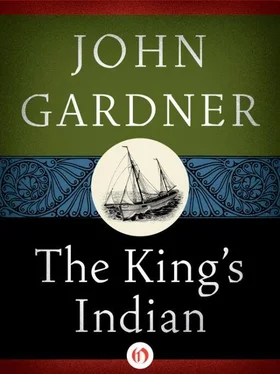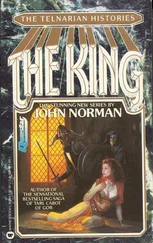“When I turned the page I got another surprise. There stood Augusta’s black mastiff, ‘Wonderdog,’ and across from the dog sat ‘Swami Havananda,’ Flint’s assistant — inventor of illusions, piano player, personal bodyguard, cut-throat. It was Wilkins.
“The history of that crowd, if the book could be believed, was enough to make a man’s blood curdle. They were gypsies to the core, the pack of them; tricksters by maniacal compulsion. Flint might have been one of the greatest of stage illusionists, but the urge to deceive was boundless in him: The rabbit in the hat, the levitated lady, the mesmerized child that a man could drive nails in, all those were mere taps at the jalousie of the madman’s boundless ego. He must bamboozle churches, steal fortunes from crafty, perspicacious old brokers, steal the chief ship from the daring and bloodthirsty pirates of China Bay, and, soon after, the golden, emerald-studded crown from the King of Sweden. His present whereabouts, the book said, had been unknown for years.
“So now I knew everything — or so I thought. The trouble was, what could I do with it? Because sure as her name was Miranda Flint— and sure as that dagger in the sailor’s neck was none other than Miranda’s — I’d been in love with that murdering vixen all my life.
“ ‘Ah, well,’ said the huge, partly visible pigeon, and sadly shook its head, ‘something may come of this queer business yet.’
“ ‘Never,’ I said bitterly, and closed the book.
“It was the next morning that Billy More was flogged for mutinous agitation. Mr. Knight, looking miserable, managed the whip. ‘In the name of the Father, and of the Son, and of the Holy Ghost!’ old Captain Dirge mumbled, staring at the planks. Jeremiah’s face was white, his blind eyes wide. ‘Repent, Captain Dirge! The heavens have turned their face! I implore thee!’
“That afternoon came the mutiny.”
XXII
“Mutiny, ye say?” says the guest, uneasy.
The mariner looks troubled. He knows himself that the tale’s overblown, too pleached and twisted for an evening’s entertainment. The dead have been gone from the fields for hours, and the sheep as well (it’s midnight now). The angel is fast asleep, dead-drunk. For the living there are roads to be gotten down, and in the morning, pigs to feed, cows to milk, children to be gotten to the schoolbus on time. The ticks of the clock ring loud and ironic on the fireplace stones.
“Having come so far—” says the mariner’s eye.
Halfway to the mountains, in a white house with towers, a fifty-year-old sculptor with a terminal disease sits painting with infinite patience and total concentration a pale yellow lemon on a field of white. With each light stroke added, the lemon shows more its inclination to vanish. Oh, all very well for a man like Flint to play tricks on the world, void his span on mere lunacy! The man in the tower has a son to raise, a wife whose life’s meaning is tottering even now. His hand grows steadier, severe as steel; in his mind all reality expands toward white.
A knock at the public-house door; the door opens. Lo and behold, it’s Luther Flint, with eyes like fire, one arm reaching inward; behind him a terrible, ravaged Miranda! He snatches off his top-hat, makes a grab at her arm. Their faces are gray, as gray as the faces of newly drained cadavers at the mortuary. He stretches his arm out once more in supplication. Mere fictions, cartoons, though more real than the stones of my dungeon room, the gallows in the square. Surely some truth can be found for these creatures, some church-hard solidity, salvation of phantoms!
Beyond the barn, old trees stand listening, reaching through the darkness toward snakes and toads, toward the sleeping sheep, with anguish like a mother’s, listening in a terror of concern for the footsteps of spiders gone astray. Say no more of the thousand-mile animal, philosopher! I gave you an animal large as the world, blind and full of terror, purposeless, searching.
“Aye!” says the mariner. “Mutiny. Aye sir!”
And now the guest, too, feels the trees groping inward, dark, age-old, mute inglorious Miltons, hungry as the heart of the sculptor, the sculptor’s dog.
The guest glances at the clock. “Tell on.”
XXIII
“Captain Dirge sat freezing — silently, motionlessly raving in the hold— his fine clothes crumpled and squeezed where the heavy gray cords cut in, and his eyes were shut tight, his fingers as still as a deadman’s. Wilkins had gagged him with coarse rope lapped three times and knotted wet, so that now that it was frozen stiff and contracted, caked blood-chips glinted on the Captain’s lace collar and matted his great black beard. At the end of an hour, his jerking stopped, as if finally he’d understood he was not to be resurrected. Mr. Knight was dead. Billy More was dead. Jeremiah had vanished. The mutineers had spared me — had put off reaching a decision about me. I’d rolled my eyes and knocked my bony knees together and insisted in the voice of a Gold Coast man that I was really a black; mad scientists in Zurich had transmogrified me. Scoff as they might, or bang their heads with their knuckles in frustration, the white mutineers couldn’t risk the displeasure of the slaves they’d freed. And Billy More swore that what I claimed was true. After Billy More was dead himself — killed with Mr. Knight, and for the same mistake — the mutineers forgot me, left me there lashed to the ice-crusted foremast and didn’t remember my existence till the violence was done with.
“I watched the executions. The mutineers, who’d begun with only axes and axehandles, had rummaged the staterooms and equipped themselves with muskets and ammunition. Then, back on deck, they proceeded straight to the forecastle, which was fastened down and sealed shut with ice, two mutineers standing one on each side of the hatch with axes, and two more by the main hatch. Below were the men who’d held loyal to the Captain — some from true loyalty, no doubt; most from conviction that the mutiny would fail. Mr. Wolff, the second mate, cracked the seal of ice with his axe and called out, ‘D’ye hear there below? Tumble up with you, one by one. Come now, and no grumbling!’ It was several minutes before anyone appeared — at last an Englishman who’d shipped as a raw hand. He was weeping piteously and beseeching the mate to spare his life. Wolff split the man’s forehead with the axe. The poor devil fell on the deck without a groan, his bright blood steaming, and the Chinese cook lifted him in his arms and tossed him to the fishes. Mr. Knight went pale. It had happened too fast for human interference, but he leaped forward now, angrily protesting, trying to take Wolff’s axe away. Billy More was right behind him. Two blacks with muskets were on them in an instant, jabbing them back with the musket barrels, and Wolff flew toward them with the axe slanting back past his shoulder. Mr. Knight stared, cringing, but it was a blast from one of the muskets that killed him. Billy More screamed, outraged. The second musket hushed him. ‘You will interfere with me no more,’ Wolff shouted. ‘You’re not in power here!’ He was dwarfish, bespectacled; his straight blond hair fluttered around his shoulders as if terrified birds flew inside it, and he foundered like a drunk in the fur coat he’d stolen from the Captain. The two shattered bodies lay reaching for each other. They’d neither approved nor disapproved; they’d allowed it to happen, true democratic hearts, and when the thing had turned murderous (who could have imagined that Wolff would suddenly assert himself?), they were powerless to stop it.
“The ruckus had alerted the others below; and now neither threats nor promises could induce them to come out. Then Wilkins said in his loud, reedy voice, bending close to the hatch, twitching, leering, his puffy, slanted black eyes like needles, ‘Why not smoke ‘em out?’ A rush ensued, and it seemed for a moment that the ship might be retaken. But the mutineers managed to close off the forecastle after only six had reached the deck, and seeing themselves outnumbered, they gave up hope and submitted. Wolff spoke them fair, knowing all he said would be heard below. Within minutes the rest had emerged on deck. They ascended one by one and were pinioned and thrown on their backs — fourteen in all.
Читать дальше











![John Bruce - The Lettsomian Lectures on Diseases and Disorders of the Heart and Arteries in Middle and Advanced Life [1900-1901]](/books/749387/john-bruce-the-lettsomian-lectures-on-diseases-and-disorders-of-the-heart-and-arteries-in-middle-and-advanced-life-1900-1901-thumb.webp)
